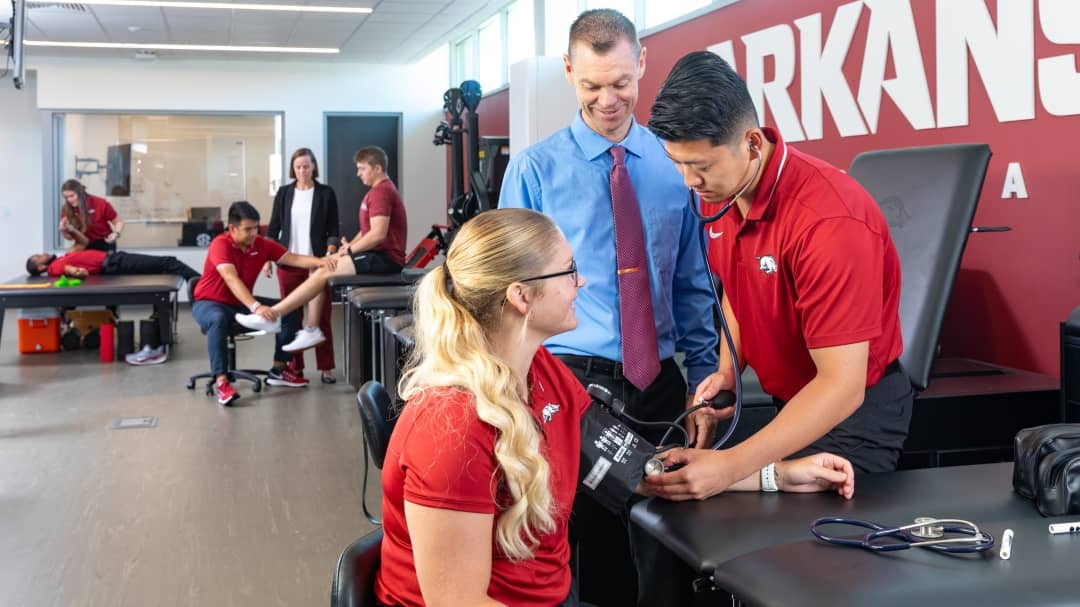Clinical Education

Clinical Requirements
The purpose of the Clinical Instruction Plan at the University of Arkansas is to place students in a structured clinical setting where they can develop their athletic training skills under the direct supervision of an athletic training preceptor or physician certified by the Board of Certification for Athletic Trainers (BOC). The goal of the clinical education program is to provide students with the opportunity to put their didactic learning into practice. Students' clinical education experiences include clients/patients:
- Throughout the lifespan (for example, pediatric, adult, elderly)
- Of different sexes
- With different socioeconomic statuses
- Of varying levels of activity and athletic ability (for example, competitive and recreational, individual and team activities, high- and low-intensity activities)
- Who participate in nonsport activities (for example, participants in military, industrial, occupational, leisure activities, performing arts)
Additionally, clinical education opportunities are planned so that students gain exposures to a variety of health conditions commonly seen in athletic training practice including patients/clients with the following types of conditions:
- Emergent, behavioral (mental health), musculoskeletal, neurological, endocrine, dermatological, cardiovascular, respiratory, gastrointestinal, genitourinary, otolaryngological, ophthalmological, dental, environmental conditions
Clinical Placements
During the clinical education experience, students will be rotated through several clinical sites and have experiences with several preceptors. During the clinical education experience, a preceptor who has successfully completed the University of Arkansas Preceptor Training will provide a mentored educational experience to athletic training students.
Year 1
| Semester 1: Summer |
Semester 2: Fall | Semester 3: Spring | |
| Course | ATTR 51303 and 52203 | ATTR 51702 | ATTR 53302 |
| Length | ~1 week = Urgent/Emergent; 2-3 week pre-season |
15 weeks |
15 weeks |
| Min/Max Hours | Urgent /Emergent = 20-30 hours Pre-season = min 50, max 150 |
Min 250, max 350 |
Min 250, max 350 |
| Clinical Care | Urgent/Emergent Care with EMS and Pre-Season Clinical | UArk Clinic or Secondary School + 1 IPP Block | UArk Clinic or Secondary School + 1 IPP Block |
| Interprofessional Collaborative Practice Block | IPP block: Urgent/ Emergent Conditions | IPP Block: Primary Care (Pat Walker Student Health Center | IPP Blocks: UAMS Ortho & Sport Medicine; UAMS PT Clinic |
Year 2
| Semester 4: Summer | Semester 5: Fall | Semester 6: Spring | |
| Course | ATTR 54402 | ATTR 52503 | ATTR 52702 |
| Length |
4-6 weeks Immersive Block** (Summer 2) |
13-15 week Immersive | 15 weeks |
| Min/Max Hours |
Min 120, max 450 |
Min 410, max 780 | Min 250, max 480 |
| Clinical Care | “Choice” based on student goals* | Based on student goals + identified condition/population needs | Based on student goals + identified condition/population needs |
| Interprofessional Collaborative Practice Block | n/a; no defined block, occurs in immersive experience | n/a; no defined block, occurs in immersive experience | IPP block: Primary Care (MANA Family Medicine) |
* Each immersive clinical site must meet three criteria: 1) identified threshold for patient volume, 2) allow adequate autonomy of the student OR meet a significant student goal for job placement/networking (in the case of some summer opportunities) and 3) allow students to complete assigned projects/products. Students earn the right to identify their choice clinical site by meeting all program benchmarks for adequate program progression (see Program Manual for details).
** The Summer 2 immersive experience must be at least 4 weeks in length with an average of at least 30 hours per week of clinical education experiences.
*** The Fall 2 immersive experience must be a minimum of 13 weeks in length with an average of at least 32 hours per week of clinical education experiences.
Students in the University of Arkansas M.A.T. program are responsible for finding potential Summer 2 immersive clinical education experiences with the assistance of the Clinical Education Coordinator. This means that students can find opportunities in any athletic training setting, anywhere in the U.S., as a clinical site so long as the minimum requirements to become a clinical site and preceptor can be met in reasonable time. In addition, students must have met program specified benchmarks to ensure that they are ready for their immersive clinical education experience.
Clinical Site Opportunities has additional information on established clinical sites for the M.A.T. program.